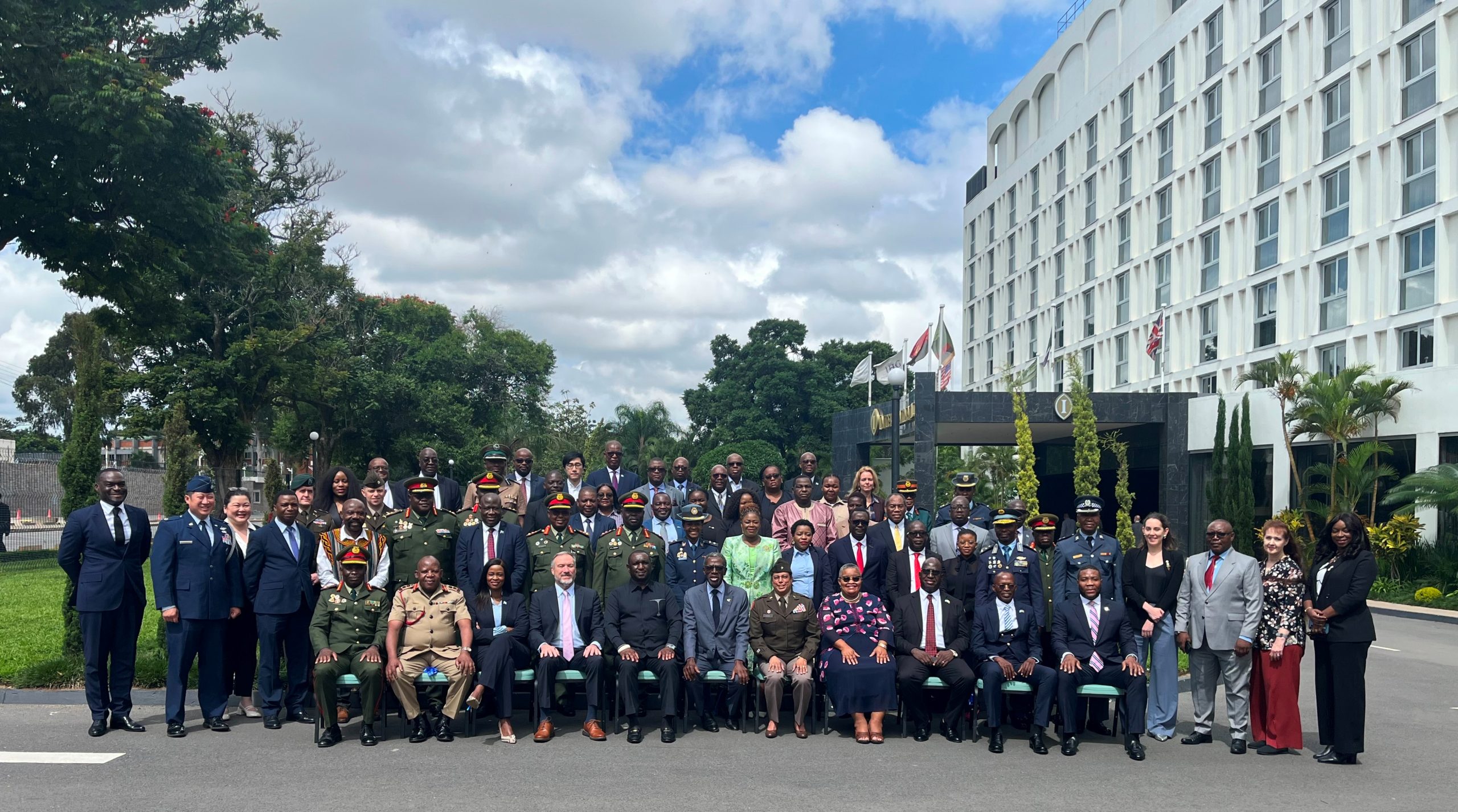Multiple alumni were key stakeholders in the National Security Strategy and Rule of Law (NSSD-RoL) Roundtable, which the Africa Center for Strategic Studies convened from February 4-7 in Lusaka, Zambia. The roundtable was a timely and strategic response to Zambia’s adoption of its National Security Strategy (NSS) in 2024—a significant milestone aimed at strengthening the country’s security governance framework. In the wake of this development, Zambian defense and security leaders expressed a strong interest in a dedicated forum to explore effective mechanisms for overseeing the implementation of the NSS, ensuring it translates into actionable policies and institutional reforms.
Recognizing the importance of locally driven solutions, the Zambian Army Commander, the National Security Advisor, and their respective teams partnered closely with Africa Center faculty to co-design a program tailored to Zambia’s unique security environment and institutional needs. This collaboration was further enhanced by the concurrent deployment of the United States’ State Partnership Program (SPP) to Lusaka, which brought additional expertise and opportunities for cross-national dialogue. The timing allowed for synergies between the roundtable and ongoing SPP activities, deepening the practical value of the discussions. To foster a rich environment for peer learning and regional cooperation, the NSSD-RoL roundtable also included high-level delegations from Botswana and Malawi. Both countries are currently engaged in their own national security strategy development processes and, like Zambia, are partnered with the state of North Carolina under the SPP framework. Their participation not only facilitated the exchange of best practices and lessons learned but also reinforced a broader regional commitment to advancing rule of law and accountability within national security institutions.
The roundtable sought to enable participants to better align national security priorities across various sectors and to ensure that the coordination of resources, intelligence, policies, and actions contributes to cohesive risk mitigation and responses to priority threats. Through this high-level event, the Africa Center sought to strengthen working relationships between policymakers and oversight authorities in the security sector, in order to ensure that NSS is adequately funded and that the financial and human resources allocated to NSS implementation are used effectively in service of the people. The roundtable supported the discussion of tangible plans and innovative practices to boost accountable oversight of the NSS and the security resources that are needed to achieve a country’s security goals and deliver security services to citizens.
The summary of discussions and recommendations was generated by the 42 roundtable participants representing Botswana, Malawi, South Africa, and Zambia. These participants came from a diverse range of institutions, including NSS coordination bodies, Office of the President, the armed forces, civilian ministries, national parliaments, ombuds institutions, anti-corruption commissions, human rights commissions, civil society organizations, and academic institutions doing work related to NSS development and implementation. In addition, the Africa Center was pleased to welcome partners from the Southern African Development Community Parliamentary Forum (SADC PF), and the University of Pretoria.
The events combined a robust academic roundtable staffed by interagency and academic experts with an Africa Center-Zambia alumni event that convened a wide range of emerging and seasoned alumni as well as the U.S. Defense Attaché, Matthew Zan, and his wife, to process and further disseminate the conclusions and ways forward determined at the roundtable.
Of note, the roundtable began with keynote remarks from Mr. Dan Hampton, Acting Director of the Africa Center, Lt. Gen. Geoffrey Zyeele, Commander of Zambia Army, His Excellency Norman Chipakupaku, Permanent Secretary of Zambia Ministry of Defence, and Brig. Gen. Christina Moore, Assistant Adjutant General at the North Carolina Joint Force Headquarters.
“This wasn’t just a workshop—it was a drafting table for how we secure our countries together.”
– Participant from Malawi
Over three days, the roundtable provided a platform for participants to share best practices and innovative approaches to enhance the capabilities of national security leaders and oversight actors. The roundtable focused on developing strategic solutions for national security challenges, ensuring that policies are rooted in democratic oversight and responsive to citizens’ needs. This collaborative effort enabled key stakeholders from all participating countries to:
- Cultivate an exchange between national security coordination bodies, parliamentarians, policymakers, and oversight institutions to explore how strategic national security solutions can be effectively tailored and applied to address each country’s unique security challenges;
- Facilitate practical, solutions-oriented analysis of how defense and oversight actors can align their roles and responsibilities to enhance the implementation of national security strategies;
- Provide a platform for enhancing civil-military collaboration and refining processes for civilian-led oversight of national security strategy implementation.
A Platform for Shared Solutions
Participants included representatives from executive offices, national parliaments, defense forces, interior ministries, anti-corruption bodies, human rights commissions, civil society organizations, and academia. Together, they crafted a tailored set of conclusions and recommendations, addressing ways to improve performance within the defense sector by integrating oversight and the rule of law into national security strategy implementation. These actionable recommendations focused on enhancing accountability, effectiveness, and transparency across defense and security sectors in ways that would improve the legitimacy of the national security strategy itself and the political will to provide the requisite defense sector resourcing for it.
“This event reminded us that human security and the rule of law are not just side notes—they are fundamental to national defense,” said one participant from Zambia.
From Botswana, a civil society representative added, “The Africa Center gives us a space where civilian and military voices can speak as equals. That’s rare—and necessary.”


